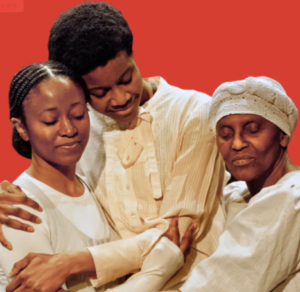
Lola May as daughter Aramide, Oyin Orija as mother Omotola and Anni Domingo as grandmother Agbeke in Here’s What She Said To Me
From its haunting opening, ghostly figures inching to the front of the house, to its comforting close, ghosts returned to light, colour and each other’s embrace, Elufowoju crafts this incredibly personal set of interwoven life journeys into a gripping piece of theatre. Performers Anni Domingo (Agbeke, grandmother), Oyin Orija (Omotola, mother) and Lola May (Aramide, daughter) switch and shift through decades and surroundings with masterful ease, carrying the gravitas of the story within their meticulous physicality. Complemented by musical – and eventually spoken – interjections from Ayan De First, the ensemble combine African and Western theatre tradition (music, poetry and movement) to deliver these voices of African Diaspora in the twenty-first century.
The company aims to dispel stereotypes and represent authentic voices, as Elufowoju asserts in the post-show Q&A session when asked how they navigate the concern of contributing to a negative image of African experience. The counter to misrepresentation can of course only be authentic representation, and this story is so generous and sensitive with its detail that it can only be the tellers’ truth. Indeed, the director confesses that the show is semi-autobiographical, written in conversation, collaboration and workshop with Agbolaje – a fitting process to honour a culture of communal verbal storytelling. She touches on the context of this particular story, and reminds the audience that the happenings within are of a certain time.
Set and costume design by Emma Williams are simple but effective, serving the multi-roleing performance style and heightening the emotional impact by drawing focus into the audience’s imaginations. You are invited, encouragingly, to listen actively. Embodying many different instrumental men and women in the three characters’ intersecting domestic lives, the show has received criticism both for being written by a man and conversely for showcasing such bad behaviour by the men in the story. And for all the love and respect at its heart, this is not a story that will send you home with an alleviated fear and distaste of what men do to women. It is unflinchingly honest in its portrayal of tragically everyday occurences, and though careful, could be triggering for many. Elufowoju speaks of the importance of discourse in the aftermath of these stories being told, especially within and involving all of the communities they are representing. A question the play asks again and again is: what do we do with this knowledge? How do we process our heritage, our past, our trauma, learn from our mistakes and protect younger generations from the same harm?
“I can’t live for your pain, mum.”
These women brave grief, disownment, isolation, deep disillusionment, heartbreak, abandonment, violence and profound loss. The dreamlike montage of memories gathered and presented in their emotive state drifts through hopes being born and dashed as if they were nothing, highlighting the habitual quietness of each human life alone, and the raucousness of both nurture and violence of life in community. All of these are cohabiting truths in their stories of daughterhood, motherhood, identity and agency.
Here’s What She Said To Me is playing for one more night at the end of its tour, on Friday 18 March at York Theatre Royal. Tickets and more information here.



